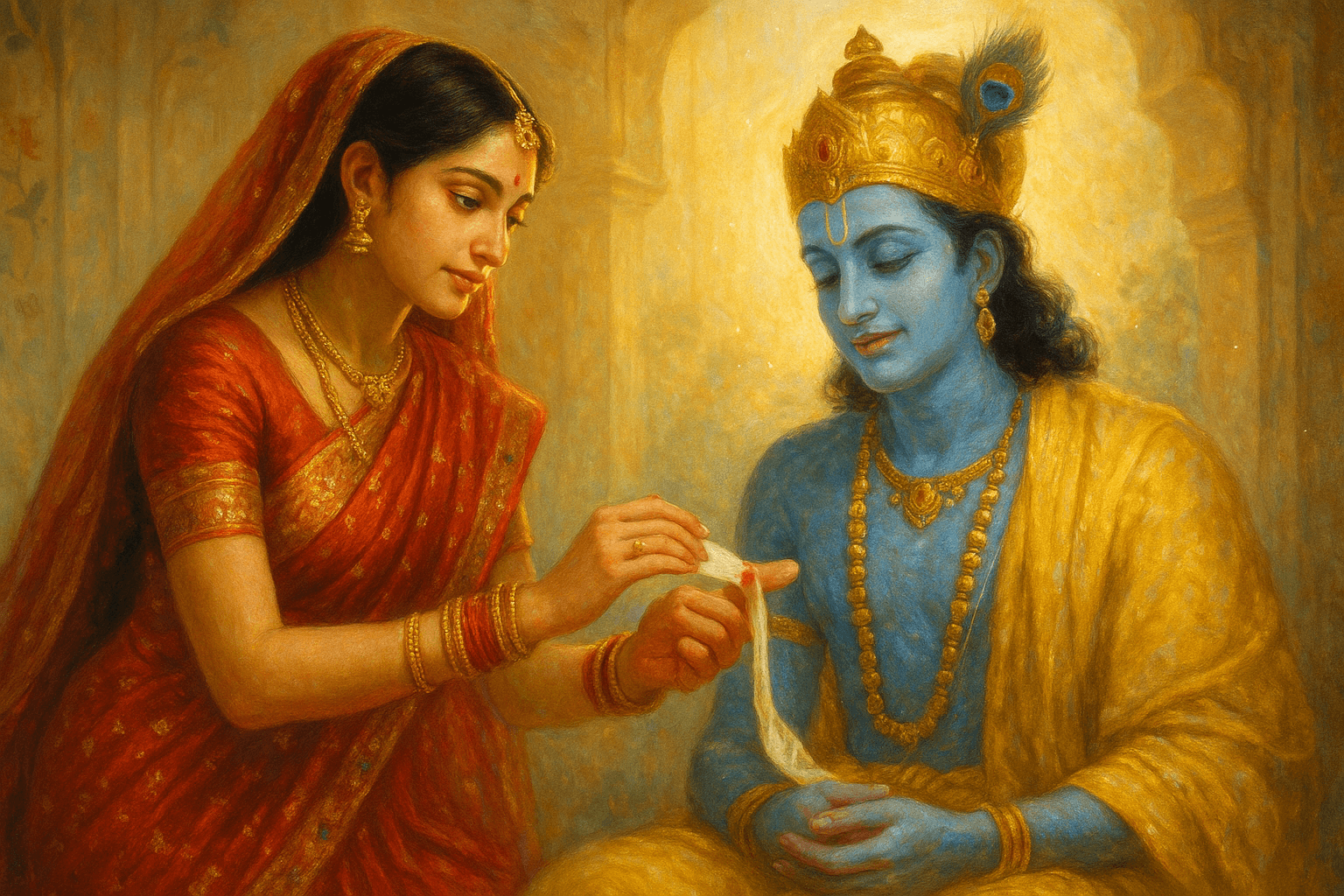In the vast ocean of the Mahabharata’s stories, there is one small, almost unnoticed ripple that became a tidal wave in destiny’s design. It wasn’t a war council or a divine curse. It was a simple act of compassion — a woman tearing a strip of her sari.
That woman was Draupadi. The recipient? Lord Krishna. The outcome? A vow that would echo across the corridors of time, reshaping fate itself.
A Rakhi Born of Empathy
Long before Raksha Bandhan became the festival of threads, sweets, and sibling vows, there was a moment that embodied its spirit without ceremony or fanfare.
One day, Krishna injured his finger — some say while cutting sugarcane, others claim during his battle with Shishupala. Without hesitation, Draupadi, his dear friend, tore a piece from her sari and gently wrapped it around his wound. There was no ritual, no audience — only a reflexive act of care.
In that moment, she wasn’t just stopping the bleeding. She was weaving a bond. Not of blood, but of trust and love.
A Vow of Eternal Protection
Krishna, moved by Draupadi’s instinctive kindness, made her a promise: whenever she was in danger, he would come to her aid. It was not a casual assurance but a sacred commitment — dharma itself responding to devotion.
This vow lay dormant until the infamous day in Hastinapura’s court, when the Kauravas sought to strip Draupadi of her dignity. As she cried out in silent prayer, Krishna answered. The cloth of her sari grew endlessly, defying her tormentors and preserving her honor.
The miracle was not just in the fabric’s length — it was in the fulfillment of a promise made long before, in an unguarded moment of compassion.
The True Miracle: Faith in Action
Many remember the endless sari as divine spectacle. Yet the deeper lesson lies in the seed that made it possible — an act done without expectation.
As writer Riya Kumari notes:
“This wasn’t a festive Raksha Bandhan with sweets and tilak. It was spontaneous bhakti… Draupadi made Krishna not just her sakha (friend), but her sankat-mochak (remover of troubles).”
That strip of cloth was more than fabric — it was a living prayer, a declaration of faith that became her anchor in the storm.
Beyond Blood Ties
Draupadi’s raksha-thread teaches an uncomfortable truth for those who think protection is owed only by birthright: true bonds are forged by trust and sacrifice, not family trees.
Commentators often say that in that instant, Draupadi gave Krishna the highest gift a friend can — not flattery, not wealth, but a part of herself in service of his need. And in return, she received not just protection, but the assurance that her dignity was sacred in the eyes of the divine.
Why It Matters Today
In an age where rituals can feel hollow and relationships transactional, Draupadi’s act reminds us that the strongest bonds are woven quietly, often when no one is watching. Raksha Bandhan, at its heart, is not about the thread but the intention behind it.
This year, as you tie a rakhi or receive one, ask yourself:
- Am I willing to protect without expectation of return?
- Do I honor my promises, especially those made in small, quiet moments?
- Who in my life is bound to me not by obligation, but by shared trust and devotion?
Reflect and Celebrate
Let Raksha Bandhan be more than an exchange of gifts and greetings. Let it be a moment to:
- Embrace bonds that transcend lineage — with friends, mentors, or even the divine.
- Honor the power of small, selfless acts that echo far beyond their moment.
- Live with the awareness that dharma responds to devotion — that the universe often answers the purest threads we weave.
Draupadi’s strip of sari was never meant to be remembered as a festival accessory. Yet it has become a timeless emblem of protection born from love — the kind of love that, once given, becomes an eternal promise.

